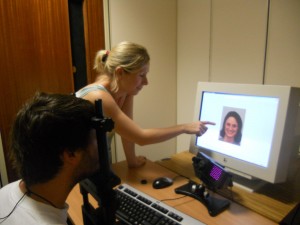 Prosopagnosia, or face blindness, refers to a severe deficit in recognizing familiar people from their face. The condition affects people in different ways with some experiencing difficulties in the recognition of faces and others experiencing problems recognising other things, such as objects, cars, or animals, as well as faces. Many of those people diagnosed with prosopagnosia report difficulties in other aspects of face processing, such as judging age or gender, and the majority report navigational difficulties. Dr Sarah Bate is a neuropsychologist working in BU’s Psychology Research Group and has been researching the condition for a number of years.
Prosopagnosia, or face blindness, refers to a severe deficit in recognizing familiar people from their face. The condition affects people in different ways with some experiencing difficulties in the recognition of faces and others experiencing problems recognising other things, such as objects, cars, or animals, as well as faces. Many of those people diagnosed with prosopagnosia report difficulties in other aspects of face processing, such as judging age or gender, and the majority report navigational difficulties. Dr Sarah Bate is a neuropsychologist working in BU’s Psychology Research Group and has been researching the condition for a number of years.
The condition might be more common than previously thought with one study suggesting that as many as 2.5% of the population might have developmental prosopagnosia.
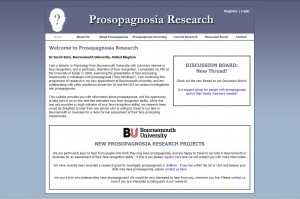 Working with Dr Brad Duchaine (Dartmouth College), Sarah is developing and testing some intervention programmes that might improve face processing in prosopagnosia. Sarah has set up a website (www.prosopagnosiaresearch.org) to raise awareness of prosopagnia and to recruit candidates for her research. Sarah has devised an online test of face recognition ability which can be taken via the website. I took the test last night and highly recommend that others have a go. To date almost 4,000 people worldwide have taken the test. At the end of the test you will be given the option to register your details to visit Sarah at BU for a more formal assessment. During formal assessments Sarah makes use of BU’s eye-tracking technology to assess how prosopagnosics visually read faces.
Working with Dr Brad Duchaine (Dartmouth College), Sarah is developing and testing some intervention programmes that might improve face processing in prosopagnosia. Sarah has set up a website (www.prosopagnosiaresearch.org) to raise awareness of prosopagnia and to recruit candidates for her research. Sarah has devised an online test of face recognition ability which can be taken via the website. I took the test last night and highly recommend that others have a go. To date almost 4,000 people worldwide have taken the test. At the end of the test you will be given the option to register your details to visit Sarah at BU for a more formal assessment. During formal assessments Sarah makes use of BU’s eye-tracking technology to assess how prosopagnosics visually read faces.
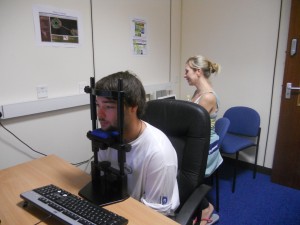 Sarah is also interested in whether face blindness is hereditary and physiological rather than psychological. She is colaborating with genetics researchers to test families of prosopagnosics and examine any links. The research is ongoing, but initial findings suggest prosopagnia is hereditry, but not always. Sarah’s research aims to identify the sub-types and various causes of prosopagnia, and to improve public understanding of the condition, as well as increasing the early diagnosis of the condition in children.
Sarah is also interested in whether face blindness is hereditary and physiological rather than psychological. She is colaborating with genetics researchers to test families of prosopagnosics and examine any links. The research is ongoing, but initial findings suggest prosopagnia is hereditry, but not always. Sarah’s research aims to identify the sub-types and various causes of prosopagnia, and to improve public understanding of the condition, as well as increasing the early diagnosis of the condition in children.
The Psychology Research Group are always looking for volunteers to take part in their research (example projects include navigation and ageing, children’s language and literature development, and poor sleep in school children). To find out more, visit the psychology volunteers section on the Group’s website.
Sarah’s research has recently been featured in the Guardian. You can read the full story here: Researchers explore problems of ‘face blindness’
You can test yourself for prosopagnosia at Sarah’s website: www.prosopagnosiaresearch.org
 Research round-up: we’re not getting smarter but we do know our whiskey
Research round-up: we’re not getting smarter but we do know our whiskey
 It’s a beautiful summer’s day and to celebrate the new academic year the Research Development Unit has some exciting news – the launch of the
It’s a beautiful summer’s day and to celebrate the new academic year the Research Development Unit has some exciting news – the launch of the 
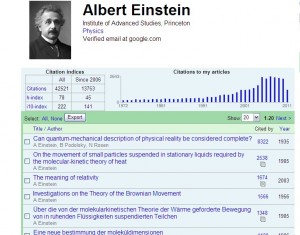

 Back in April it was announced that BU would be launching an Open Access Publication Fund in August 2011 (see the previous blog post here:
Back in April it was announced that BU would be launching an Open Access Publication Fund in August 2011 (see the previous blog post here: 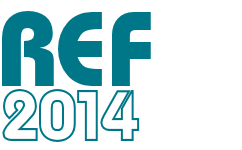











 World Drowning Prevention Day at BU
World Drowning Prevention Day at BU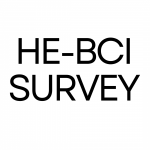 Contribute to the HE-BCI survey by sharing your involvement in BU’s social, community & cultural events
Contribute to the HE-BCI survey by sharing your involvement in BU’s social, community & cultural events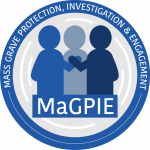 MaGPIE Publishes Collaborative Paper in the IRRC
MaGPIE Publishes Collaborative Paper in the IRRC Conversation article: Five ways to keep teenagers safe by the water
Conversation article: Five ways to keep teenagers safe by the water MSCA Postdoctoral Fellowships 2025 Call
MSCA Postdoctoral Fellowships 2025 Call ERC Advanced Grant 2025 Webinar
ERC Advanced Grant 2025 Webinar Horizon Europe Work Programme 2025 Published
Horizon Europe Work Programme 2025 Published Horizon Europe 2025 Work Programme pre-Published
Horizon Europe 2025 Work Programme pre-Published Update on UKRO services
Update on UKRO services European research project exploring use of ‘virtual twins’ to better manage metabolic associated fatty liver disease
European research project exploring use of ‘virtual twins’ to better manage metabolic associated fatty liver disease